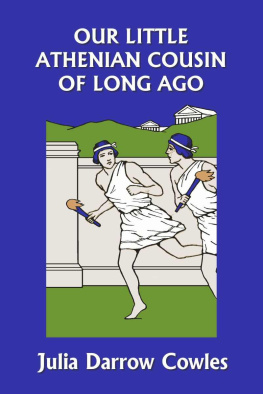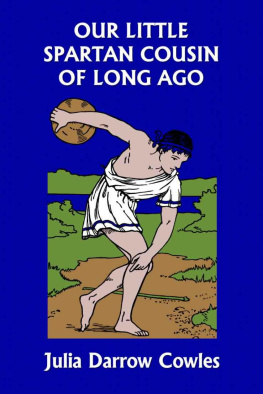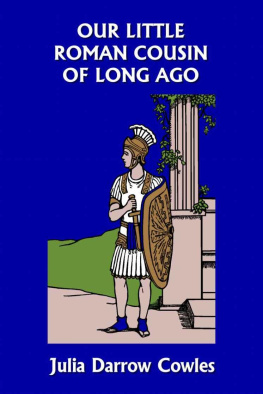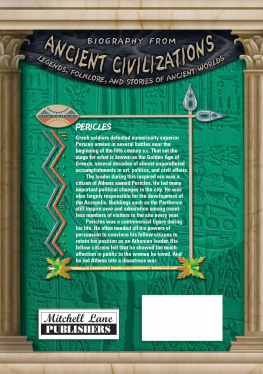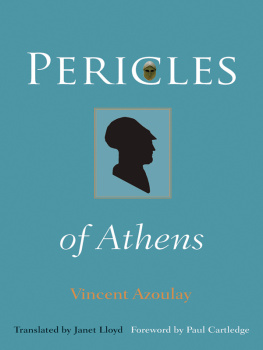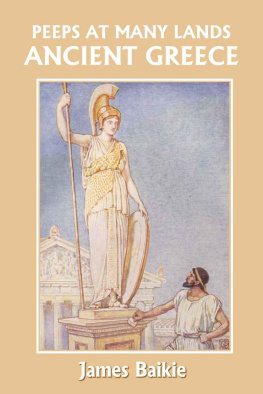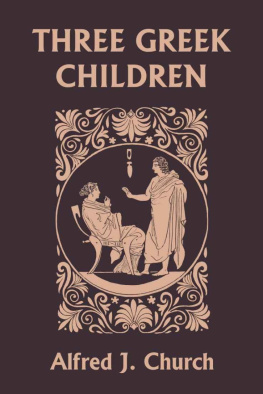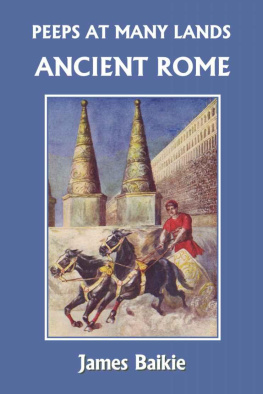Our Little Athenian Cousin of Long Ago
by
Julia Darrow Cowles
Yesterday's Classics
Chapel Hill, North Carolina
Cover and Arrangement 2010 Yesterday's Classics, LLC
All rights reserved. No part of this book may be reproduced or retransmitted in any form or by any means without the written permission of the publisher.
This edition, first published in 2010 by Yesterday's Classics, an imprint of Yesterday's Classics, LLC, is an unabridged republication of the work originally published by L. C. Page and Company in 1913. This title is available in a print edition (ISBN 978-1-59915-283-7).
Yesterday's Classics, LLC
PO Box 3418
Chapel Hill, NC 27515
Yesterday's Classics
Yesterday's Classics republishes classic books for children from the golden age of children's literature, the era from 1880 to 1920. Many of our titles are offered in high-quality paperback editions, with text cast in modern easy-to-read type for today's readers. The illustrations from the original volumes are included except in those few cases where the quality of the original images is too low to make their reproduction feasible. Unless specified otherwise, color illustrations in the original volumes are rendered in black and white in our print editions.
Preface
As Rome is associated in the minds of all with military heroism and power, so Athens is associated with art. The story of O UR L ITTLE A THENIAN C OUSIN OF L ONG A GO has for its setting the reign of Pericles, 444-429 B.C., when Athens was at the zenith of her power and glory, and when art and architecture reached their climax.
The story has been purposely made to emphasize the artistic, rather than the political, side of Athenian life, since it is through its art that Athens has most powerfully influenced our own life and times.
Every care has been taken to make the story a vivid portrayal of the civic and home life of a child of the time, while adhering strictly to the best authorities in regard to detail.
Contents
CHAPTER I
The Guest-Friend
M ORE than twenty-three hundred years ago two travellers, richly dressed, and mounted upon donkeys, made their way slowly along the narrow and irregular streets of Athens. They were followed on foot by a group of slaves, who carried huge bundles in which were blankets, clothing and cooking utensils, showing that they had journeyed from some distance.
The travellers were Phorion, a famous Grecian architect, and Duris, his son, a boy of twelve years.
Presently they stopped before a house in the Street of the Sculptors, and one of the slaves rapped loudly upon the door.
"I believe this is the house of Hermippos," said Phorion.
"I do not see how you can tell," replied Duris. "They all look exactly alike to me." And he glanced up at the wall of the house, which was close to the street. There were windows in the upper story, but none in the lower. A single door relieved the bare face of the lower wall. All the houses up and down the street were built in a similar way.
Before Phorion could answer there sounded a sharp rap upon the inner side of the door to warn them that it was about to be opened, and the slaves stepped quickly to one side so that, in swinging outward, the heavy door should not strike them.
A slave appeared in the opening, and Manes, one of the slaves of Phorion, approached him.
"My master, Phorion," said Manes, "has come from a far distant island and is worn with the long journey. His family are guest-friends of your master's family. In token of this, here is the broken ring which is the sign of their treaty. The other half of the ring is in the keeping of your master."
The slave took the broken ring, bade the two guests enter, and went to seek Hermippos.
Duris looked about him at the furnishings of the court of the house in which they waited. There were chairs, couches and tables about, and all were of simple materials, but artistic in shape. The lamps, of which there were a large number, consisted of an open vessel for oil in which a wick was placed, and all were beautiful in form and in workmanship.
Several rooms opened from the court, and presently from one of these stepped Hermippos, the sculptor. He was a tall man of fine appearance, and Duris liked him at once. But Duris was even more pleased at sight of a young boy of about his own age, who followed Hermippos.
"Ah," he said to himself, "now I shall have a fine time during my stay in Athens. I did not know that Hermippos had a son."
Greetings were exchanged between the two men, and Duris was introduced to Hiero, the son of Hermippos. Hiero was a fine specimen of an Athenian boy, and as Duris looked into his manly, attractive face, he felt that his own visit to Athens had taken on new interest.
The two artists were soon busily engaged in discussing the buildings and sculptures of Athens.
"Pericles is doing wonderful things for the city," said Hermippos. "He is a successful general and a wise and unselfish ruler. But he is a lover of art and of beauty as well, and he has determined that Athens shall be made the most beautiful city in the world."
"I am very anxious to see the Parthenon," said Phorion, "for I understand that it is the most magnificent temple ever built."
"It is," replied Hermippos earnestly. "I shall be glad to take you to see it. I thought it an honor to make some of the statues which are upon its walls."
"I, too, have been honored by Pericles," said Phorion, "for he has sent for me to plan a great music hall, which he is about to build."
"That is an honor, indeed," replied Hermippos. "We must visit the Acropolis to-morrow, and you, of course, must pay your respects to our ruler, Pericles."
In the meantime the boys, Hiero and Duris, were becoming acquainted also.
"I am glad you have come," said Hiero frankly. "We will have some good times together." And then he added: "I shall want to hear all about your journey from the Island. I never have travelled, but I have often wished that I might."
"I like to travel," replied Duris, "except when the sea is rough," and at that he made such a wry face that they both burst into hearty laughter.
"I am glad we are guest-friends," exclaimed Hiero. "I wonder when the treaty was made between our families."
"I understand," replied Duris, "that some of our ancestors fought together in battle a great many years ago and became much attached to each other. So they agreed that when any of my ancestor's family visited Athens they should be your guests, and when any of your ancestor's family visited our home they should be our guests. So they took a ring which one of them was wearing and broke it in half. And the broken ring has been passed down from father to son, and is kept as a token of the family treaty."
"That is very interesting," said Hiero earnestly, as Duris finished his story.
The custom which Duris had described did not seem at all strange to Hiero, for in that far distant time inns were few and small, and were far from being comfortable. Neither did the fact that Duris and his father had come unexpectedly surprise him, even though their visit was likely to prove a long one, for railways, mail service, telephones and the telegraph had never been heard of, so there was usually no way. of knowing when a guest was to arrive until he presented himself at the door. But the people of Greece were kindly and hospitable and often cared for strangers who were not guest-friends.
"Tell me about your journey here," urged Hiero, for by this time the boys had begun to feel like real comrades.
"We journeyed first on foot," began Duris, "for it was some distance from our home to the seaport. The slaves, of course, carried our blankets and food, for we were two days on the way."

